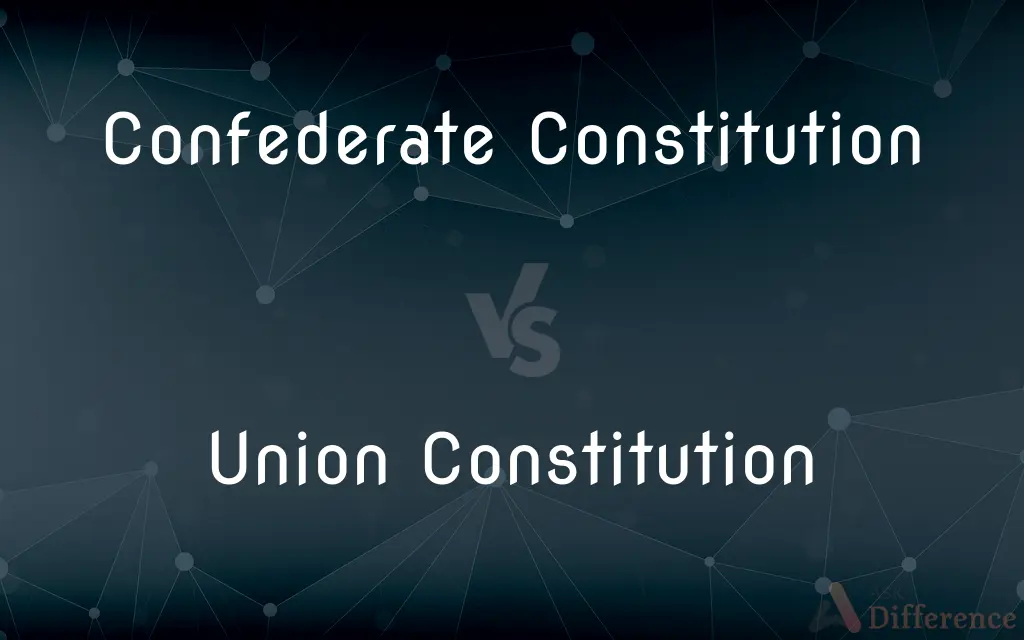Confederate Constitution vs. Union Constitution — What's the Difference?
By Fiza Rafique & Maham Liaqat — Published on November 30, 2024
The Confederate Constitution mirrored the U.S. Constitution but emphasized states' rights and explicitly supported slavery, while the Union Constitution evolved to abolish slavery and strengthen federal authority.

Difference Between Confederate Constitution and Union Constitution
Table of Contents
ADVERTISEMENT
Key Differences
The Confederate Constitution, adopted in 1861 by the secessionist states, was largely based on the U.S. Constitution but with significant amendments to strengthen states' rights and explicitly safeguard slavery. It aimed to preserve the institution of slavery as a foundational economic and social principle. In contrast, the Constitution of the United States, particularly through amendments during and after the Civil War, moved to abolish slavery and reinforce federal authority, reflecting the Union's commitment to national unity and human rights.
A key difference lies in the explicit mention of slavery in the Confederate Constitution, which protected slaveholders' rights and prohibited any legislation that would hinder this institution. This contrasts with the U.S. Constitution, which, through its 13th, 14th, and 15th Amendments, abolished slavery, granted citizenship regardless of race, and protected voting rights, respectively, fundamentally altering the nation's legal landscape in favor of civil rights and equality.
The Confederate Constitution also sought to enhance states' sovereignty, limiting the central government's power in areas such as infrastructure spending and trade regulation. It allowed states to enact laws that were in their own interests, even if at odds with the interests of the nation as a whole. The Union Constitution, especially through subsequent amendments and Supreme Court rulings, emphasized a stronger federal government with the authority to regulate interstate commerce, levy taxes, and provide for the national defense.
Furthermore, the Confederate document contained clauses aimed at preventing the enactment of protective tariffs and made it easier for states to express their sovereignty, such as by giving them the explicit right to impeach federal officials operating within their borders. The U.S. Constitution, conversely, vested significant powers in the federal government to impose tariffs and other measures to protect and encourage American industry and commerce.
The Confederate Constitution included provisions to limit the presidency to a single six-year term, reflecting a distinct approach to executive power, while the U.S. Constitution initially did not limit presidential terms. This changed with the 22nd Amendment, which imposed a two-term limit, a reaction to Franklin D. Roosevelt's four terms but unrelated to Confederate influence.
ADVERTISEMENT
Comparison Chart
Basis for Government
States' rights and slavery protection
Federal authority and individual rights
Slavery
Explicitly protected and institutionalized
Abolished through amendments
Federal vs. State Power
Limited federal power, emphasized state sovereignty
Strengthened federal power, especially in commerce and civil rights
Tariffs and Commerce
Prohibited protective tariffs, limited federal control over commerce
Allowed for protective tariffs and federal regulation of interstate commerce
Presidency Term
Single six-year term
Initially unlimited, later restricted to two four-year terms by the 22nd Amendment
Compare with Definitions
Confederate Constitution
Limited the central government's powers.
It restricted Congress from funding internal improvements.
Union Constitution
Strengthened federal authority over states.
The Supremacy Clause established federal law as the supreme law of the land.
Confederate Constitution
Established a single six-year presidential term.
Jefferson Davis served as the only president under this constitution.
Union Constitution
Permitted protective tariffs and federal commerce regulation.
The Constitution allowed for economic measures to protect American industries.
Confederate Constitution
Aimed to solidify states' rights and protect slavery.
The Confederate Constitution explicitly allowed slavery in new territories.
Union Constitution
Enacted amendments to expand civil rights and liberties.
The 14th and 15th Amendments secured rights regardless of race.
Confederate Constitution
Allowed states to impeach federal officials within their borders.
This provision gave states unprecedented power over federal operations.
Union Constitution
Evolved to abolish slavery and ensure civil rights.
The 13th Amendment made slavery unconstitutional.
Confederate Constitution
Prohibited protective tariffs.
The document aimed to foster free trade among states and with foreign nations.
Union Constitution
Introduced a two-term limit for the presidency.
The 22nd Amendment was a post-WWII reaction to FDR's four terms.
Common Curiosities
How does the Union Constitution address slavery?
It was amended to abolish slavery and protect civil rights through the 13th, 14th, and 15th Amendments.
Did the Confederate Constitution allow tariffs?
It prohibited protective tariffs, promoting free trade internally and with foreign nations.
What distinguishes the Confederate and Union Constitutions regarding state vs. federal power?
The Confederate Constitution emphasized state power and limited federal authority, while the Union Constitution strengthened federal power, especially in regulating commerce and protecting individual rights.
What was the term limit for the presidency under each constitution?
The Confederate Constitution set a single six-year term, while the Union Constitution now limits the presidency to two four-year terms.
Why did the Confederate States feel the need to draft their own constitution?
They sought to legitimize their secession and establish a government that aligned with their values, particularly states' rights and the protection of slavery.
Can the Confederate Constitution still influence modern law?
No, it has no legal standing or influence over current U.S. law.
Was slavery explicitly mentioned in the original U.S. Constitution?
It was alluded to indirectly, such as in provisions regarding apportionment and the fugitive slave clause, but not explicitly until the abolition of slavery was codified in the 13th Amendment.
How did the Union Constitution change as a result of the Civil War?
It was amended to abolish slavery, protect civil rights, and reinforce the federal government's authority.
Is the Confederate Constitution recognized internationally?
It was never recognized as a legitimate constitution by the international community.
What was the main purpose of the Confederate Constitution?
To affirm the sovereignty of states and protect the institution of slavery.
How did each constitution view the impeachment of federal officials?
The Confederate Constitution uniquely allowed states to impeach federal officials operating within their borders, unlike the Union Constitution.
What role did the Confederate Constitution play in the Civil War?
It served as a symbol and legal foundation for the Confederacy's ideological and political goals.
How do historians view the Confederate Constitution?
As a document that highlights the ideological and constitutional differences that contributed to the Civil War.
Were there any similarities between the two constitutions?
Yes, much of the Confederate Constitution was modeled directly on the U.S. Constitution, with key differences regarding states' rights and slavery.
What happened to the Confederate Constitution after the Civil War?
It became defunct with the defeat of the Confederacy, and its provisions have no legal effect today.
Share Your Discovery

Previous Comparison
Earnest Money vs. Due Diligence Money
Next Comparison
Saving vs. InvestmentAuthor Spotlight
Written by
Fiza RafiqueFiza Rafique is a skilled content writer at AskDifference.com, where she meticulously refines and enhances written pieces. Drawing from her vast editorial expertise, Fiza ensures clarity, accuracy, and precision in every article. Passionate about language, she continually seeks to elevate the quality of content for readers worldwide.
Co-written by
Maham Liaqat












































